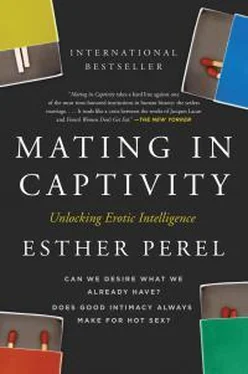Mating in Captivity
Reconciling the Erotic + the Domestic Esther Perel

Dedication
To my parents, Sala Ferlegier and Icek Perel.
Their vitality lives on in me.
Epigraph
WILD THINGS IN CAPTIVITY
Wild things in captivity
while they keep their own wild purity
won’t breed, they mope, they die.
All men are in captivity,
active with captive activity,
and the best won’t breed, though they don’t know why.
The great cage of our domesticity
kills sex in a man, the simplicity
of desire is distorted and twisted awry.
And so, with bitter perversity,
gritting against the great adversity,
the young ones copulate, hate it, and want to cry.
Sex is a state of grace.
In a cage it can’t take place.
Break the cage then, start in and try.
D. H. Lawrence
Contents
Dedication
Epigraph
Introduction
1 From Adventure to Captivity:Why the Quest for Security Saps Erotic Vitality
2 More Iintimacy, Less Sex:Love Seeks Closeness, but Desire Needs Distance
3 The Pitfalls Of Modern Intimacy:Talk Is Not the Only Avenue to Closeness
4 Democracy Versus Hot Sex:Desire and Egalitarianism Don’t Play by the Same Rules
5 Can Do!The Protestant Work Ethic Takes On the Degradation of Desire
6 Sex Is Dirty; Save It for Someone You Love:When Puritanism and Hedonism Collide
7 Erotic Blueprints:Tell Me How You Were Loved, and I’ll Tell You How You Make Love
8 Parenthood:When Three Threatens Two
9 Of Flesh and Fantasy:In the Sanctuary of the Erotic Mind We Find a Direct Route to Pleasure
10 The Shadow of the Third:Rethinking Fidelity
11 Putting the X Back in Sex:Bringing the Erotic Home
Notes
Bibliography
Searchable Terms
Acknowledgments
About the Author
Credits
Books by Esther Perel
Copyright
About the Publisher
Introduction
THE STORY OF SEX INcommitted modern couples often tells of a dwindling desire and includes a long list of sexual alibis, which claim to explain the inescapable death of eros. Recently, it seems, everyone from the morning news to the New York Times has weighed in on the topic. They warn us that too many couples are having infrequent sex even when the partners profess to love each other. Today’s twosomes are too busy, too stressed, too involved in child rearing, and too tired for sex. And if all this isn’t enough to dull their senses, then it’s the antidepressants meant to alleviate the stress that set off the final unraveling. This is indeed an ironic development for the baby boomers who some thirty years ago ushered in a new age of sexual liberation. Now that these men and women and the generations who have followed can have as much sex as they want, they seem to have lost their desire for it.
Though I have no quarrel with the accuracy of these reports in the media—our lives are surely more stressful than they should be—it seems to me that in focusing almost exclusively on the frequency and quantity of sexual relations, they address only the most superficial reasons for the malaise so many couples are feeling. I think there’s more to the story.
Psychologists, sex therapists, and social observers have long grappled with the Gordian knot of how to reconcile sexuality and domesticity. We’re offered prolific advice on how to shop in the spice market to add additional flavors to committed sex. Languishing desire, we’re coached, is a scheduling problem that can be fixed with better prioritizing and organizational skills; or it is a communication problem that can be ameliorated by verbally expressing precisely what we want sexually.
I’m less inclined toward a statistical approach to sex—whether you’re still having it, how often, how long it lasts, who comes first, and how many orgasms you have. Instead, I want to address the questions that don’t have easy answers. This book speaks about eroticism and the poetics of sex, the nature of erotic desire and its attendant dilemmas. When you love someone, how does it feel? And when you desire someone, how is it different? Does good intimacy always lead to good sex? Why is it that the transition to parenthood so often spells erotic disaster? Why is the forbidden so erotic? Is it possible to want what we already have?
We all share a fundamental need for security, which propels us toward committed relationships in the first place; but we have an equally strong need for adventure and excitement. Modern romance promises that it’s possible to meet these two distinct sets of needs in one place. Still, I’m not convinced. Today, we turn to one person to provide what an entire village once did: a sense of grounding, meaning, and continuity. At the same time, we expect our committed relationships to be romantic as well as emotionally and sexually fulfilling. Is it any wonder that so many relationships crumble under the weight of it all? It’s hard to generate excitement, anticipation, and lust with the same person you look to for comfort and stability, but it’s not impossible. I invite you to think about ways you might introduce risk to safety, mystery to the familiar, and novelty to the enduring.
On the way, we will address how the modern ideology of love sometimes collides with the forces of desire. Love flourishes in an atmosphere of closeness, mutuality, and equality. We seek to know our beloved, to keep him near, to contract the distance between us. We care about those we love, worry about them, and feel responsible for them. For some of us, love and desire are inseparable. But for many others, emotional intimacy inhibits erotic expression. The caring, protective elements that foster love often block the unselfconsciousness that fuels erotic pleasure.
My belief, reinforced by twenty years of practice, is that in the course of establishing security, many couples confuse love with merging. This mix-up is a bad omen for sex. To sustain an élan toward the other, there must be a synapse to cross. Eroticism requires separateness. In other words, eroticism thrives in the space between the self and the other. In order to commune with the one we love, we must be able to tolerate this void and its pall of uncertainties.
With this paradox to chew on, consider another: desire is often accompanied by feelings that would seem to cramp love’s style. Aggression, jealousy, and discord come to mind, for starters. I will explore the cultural pressures that shape domesticated sex, making it fair, equal, and safe, but also producing many bored couples. I’d like to suggest that we might have more exciting, playful, even frivolous sex if we were less constrained by our cultural penchant for democracy in the bedroom.
To buttress this notion, I take the reader on a detour into social history. We’ll see that contemporary couples invest more in love than ever before; yet, in a cruel twist of fate it is this very model of love and marriage that is behind the exponential rise in the divorce rate. Here it behooves us to question whether traditional marital structures can ever meet the modern mandate, especially when “till death do us part” entails a life span double that of past centuries.
Читать дальше











